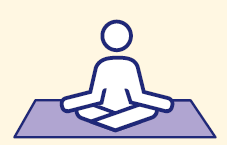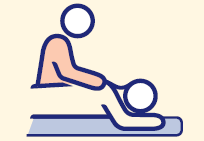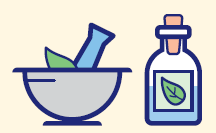Conventional medical treatments are used to remove the cancer, slow or stop the growth and spread of the disease, or provide relief from symptoms. Conventional medical treatments for cancer include surgery, radiation therapy (also known as radiotherapy) and drug therapies (such as chemotherapy, hormone therapy, targeted therapy and immunotherapy).
Conventional medical treatments are based on scientific evidence and have been through a research process to see whether they work and are safe. This is known as evidence-based medicine.
Complementary therapies are designed to be used alongside conventional cancer treatments.
We can’t tell you whether complementary therapies will be helpful for you or which ones to use. If you want to use complementary therapies, discuss this with your doctors, pharmacists, and professionals qualified in the therapies that interest you.
What are complementary therapies?
Complementary therapies are said to focus on the whole person, not just the cancer. They include practices like massage and yoga, as well as medicines that you swallow or apply to the skin. Complementary therapies are used with conventional medicines and may help people cope better with the physical and emotional impact of cancer, as well as side effects caused by conventional cancer treatments. There is no evidence complementary therapies can treat or cure cancer itself.
Complementary therapies can be grouped into the following four categories, and most are part of whole medical systems. Some therapies fit into more than one category.
 Mind-body practices are based on the belief that what we think, and feel can affect our physical and mental wellbeing. Examples include art therapy, counselling, hypnotherapy, laughter yoga, meditation, mindfulness, music therapy, relaxation, spiritual practices.
Mind-body practices are based on the belief that what we think, and feel can affect our physical and mental wellbeing. Examples include art therapy, counselling, hypnotherapy, laughter yoga, meditation, mindfulness, music therapy, relaxation, spiritual practices.
 Body-based practices work directly on your body. Examples include acupuncture, aromatherapy, massage, Qi gong, reflexology, tai chi, yoga.
Body-based practices work directly on your body. Examples include acupuncture, aromatherapy, massage, Qi gong, reflexology, tai chi, yoga.
 Energy therapies are based on the belief that the body has an invisible energy field that when blocked, can make you sick. Examples include touch, reiki.
Energy therapies are based on the belief that the body has an invisible energy field that when blocked, can make you sick. Examples include touch, reiki.
 Therapies using herbs and plants are also known as botanical medicine and are produced from all parts of the plant. Examples include bush remedies, Chinese herbal medicine, flower remedies, medicinal cannabis, Western herbal medicine.
Therapies using herbs and plants are also known as botanical medicine and are produced from all parts of the plant. Examples include bush remedies, Chinese herbal medicine, flower remedies, medicinal cannabis, Western herbal medicine.
What are alternative therapies?
People often use the terms “complementary” and “alternative” as though they mean the same thing. Although they are sometimes combined into one phrase – complementary and alternative therapies – they are different.
Alternative therapies are used instead of conventional medical treatments. Cancer Council does not recommend the use of alternative therapies as a treatment for cancer.
Many alternative therapies have not been scientifically tested, so there is no proof they stop cancer growing or spreading. Others have been tested and shown to be harmful to people with cancer or not to work. While side effects of alternative therapies are not always known, some are serious and may prevent successful treatment of the cancer.
Some alternative therapists promote their therapies and medicines as a cure for cancer and encourage people to stop using conventional cancer treatment. If this is something you are considering, please discuss this with your doctor and cancer care team first. Delaying conventional treatment to use an alternative therapy can allow the cancer to grow or make it harder to treat when you start conventional treatment. It may also mean that you are not well enough for conventional treatment.
Alternative therapies can be very expensive, and they are not covered by government-funded schemes such as Medicare or the Pharmaceutical Benefits Scheme (PBS). It is important to consider the cost of these therapies.
What is integrative oncology or medicine?
This is the combined use of conventional treatments and evidence based complementary therapies. This approach has been adopted by some cancer centres.
How is allied health different?
Allied health professionals, such as physiotherapists, exercise physiologists, dietitians and psychologists, offer a range of evidence-based therapies to diagnose and treat health conditions.
These therapies can offer people with cancer physical, emotional, spiritual and practical support, help reduce side effects from medical treatment and improve quality of life.
Many allied health practices are part of standard supportive care for cancer and allied health professionals are often members of multidisciplinary cancer teams. They have a university qualification in a recognised allied health field. They are also a member of a national professional organisation that:
-
certifies qualifications
-
sets and maintains competency standards
-
oversees continuing professional development
-
has a procedure for dealing with complaints about its members.
Your general practitioner (GP) or specialist can refer you to a range of allied health professionals who have experience working with people affected by cancer. Some allied health therapies can be claimed under Medicare if you have a referral from your GP as part of a Chronic Disease Management Plan.
Who uses complementary therapies?
Complementary therapies are widely used by people with cancer in Australia. Research shows that two out of three people with cancer used at least one form of complementary therapy during or after their cancer treatment. 2 Women are the most common users of complementary therapies.
Why do people use complementary therapies?
Complementary therapies are widely used by people with cancer in Australia. There are many reasons why people with cancer use complementary therapies, including to:
-
improve quality of life
-
take a more active role in their health and recovery
-
manage the symptoms and side effects of conventional cancer treatment, such as fatigue, nausea or pain
-
strengthen the mind and body to cope with treatment
-
look for more holistic ways of treating the whole person
-
incorporate traditional or cultural practices
Using complementary therapies in palliative care
Many palliative care services offer complementary therapies to patients to help improve their quality of life. Therapies such as aromatherapy, massage, meditation and reflexology can increase a person’s sense of control, decrease stress and anxiety, and improve mood. Health professionals involved in palliative care often support patients using complementary therapies that are safe and evidence based.
Should I tell my doctor about my complementary therapy plans?
Yes. Discuss any therapy you are using or thinking about using with your doctors, as some may not be safe or evidence based. This includes over-the-counter medicines, herbal supplements and vitamins that you buy from a pharmacy or health food store.
It’s important to tell your doctors before you start using any complementary therapy, especially if you are having chemotherapy or radiation therapy or taking any medicines. Depending on the treatment you are having, some complementary therapies may cause reactions, make side effects worse or interfere with the success of your conventional cancer treatment.
Your doctors may advise you to avoid some complementary therapies while you are having cancer treatment. Your doctor may also be able to refer you to a qualified therapist who understands the role of complementary therapies in cancer care.
Can carers use complementary therapies?
Some complementary therapies may help carers cope with stress and fatigue. Relaxation and meditation techniques can help carers maintain their energy levels and improve their quality of life.
Listen to our relaxation and meditation podcast Finding Calm During Cancer or call 13 11 20 to see if your local Cancer Council provides relaxation and meditation recordings. You could also try a local yoga or tai chi class.
Some people find meaning and comfort through spiritual practices. It may help to talk about your feelings with a spiritual care practitioner or religious leader.
Do complementary therapies work?
A clinical trial can help show whether a treatment works and is safe. In a randomised control trial, one group of people is given the new treatment and the other group is given the existing standard treatment. The results in the two groups are compared to work out which treatment is better, safer and/or more cost-effective.
If a trial proves that a treatment is better than existing options, it may become the new standard of care for patients in the future. Some clinical trials compare existing approaches to see which one is more effective.
Clinical trials for complementary therapies often test treatments on small groups of people with specific cancer types, such as breast and prostate. It can be challenging to establish whether the trial results apply to people with other types of cancer.
Personal (anecdotal) evidence is based on individual people’s experiences and observations, rather than on facts. It is not proven and is less reliable than scientific evidence from clinical trials.
Cancer Council supports the use of complementary therapies that have been proven to be generally safe and effective in clinical trials or other scientific studies. Therapies such as meditation, massage and acupuncture can increase your sense of control, decrease stress and anxiety, and improve your mood.
Some people may feel pressure from friends and family to use untested therapies. However, it’s your right to decide what treatments to have. By understanding the therapies available, the costs and health risks associated, you can weigh up the options and make informed decisions.
Are complementary therapies safe?
Some studies have found some complementary therapies to be generally safe to use together with conventional cancer treatments and medicines. However, some complementary therapies can affect the way conventional cancer treatments and medicines work, and even stop them working altogether.
All therapies have the potential to cause injury or harm. When trying anything new, discuss with your doctor and therapist whether it is suitable for you and whether you need to take any safety precautions. Visit the Question Checklist for any questions you may want to ask your doctor or a complementary therapist.
Regulations of medicines
Government department that assesses and monitors (regulates) all therapeutic goods and medicines sold in Australia. This includes complementary medicines such as herbs, vitamins, minerals, nutritional supplements, homeopathic remedies and some aromatherapy products.
All therapeutic goods supplied in Australia – whether made in Australia or overseas – must be included on the Australian Register of Therapeutic Goods (ARTG).
To ensure medicines are safe, it is best to buy Australian-made complementary medicines. For more information on the safety, labelling and regulation of medicines, visit tga.gov.au.
To be included on the ARTG, medicines will be given one of the following two codes depending on the level of risk. This must be displayed on the medicine label.
Aust R (registered) - Because these products are considered higher risk, they are evaluated by the TGA for safety, quality and how well they work. They include all prescription medicines, most over-the-counter medicines and some higher-risk complementary medicines.
Aust L (listed) - These products make low-level therapeutic claims and are reviewed for safety and quality only. They include sunscreen, vitamin and mineral supplements, and herbal medicines.
Regulations of complementary therapies
Some complementary therapists are required to be registered and accredited, but most are unregistered.
Registered health practitioners – The Australian Health Practitioner Regulation Agency (AHPRA) and 15 National Boards regulate certain types of health practitioners, such as doctors, nurses, dentists, pharmacists, psychologists, physiotherapists and Chinese medicine practitioners (including acupuncturists).
Health practitioners must meet certain standards before they can be registered and accredited with a National Board. This helps ensure that only trained and competent health professionals practise within these professions. It is unlawful for a person to pretend to be a registered health practitioner. If you have concerns about the performance or conduct of a registered health practitioner, you can contact the AHPRA.
Unregistered health practitioners – Some health practitioners are not legally required to be registered with a National Board. They are known as unregistered health practitioners or general health service providers. They may join a professional association that sets minimum standards, but membership is voluntary. In some states, unregistered health practitioners are required to follow a Code of Conduct, which must be displayed in the premises. If you have an issue with an unregistered practitioner, talk to them first. If you’re not satisfied, you can lodge a complaint (see below).
The following complementary therapy providers that are not registered with AHPRA have set up their own regulatory bodies:
Naturopaths and Western herbalists – Most naturopaths and herbalists are members of the Australian Register of Naturopaths and Herbalists (ARONAH). This is a self-governing body that sets minimum standards of practice for both professions. Visit aronah.org.
Homeopaths – The Australian Register of Homoeopaths (AROH) represents homeopaths who are qualified to practise in line with government standards. The AROH outlines the necessary professional standards for registered homeopaths, who must meet continuing education requirements each year. Visit aroh.com.au.
Signs of unsafe therapies
Keep the following warning signs in mind about any therapy or medicine you are thinking about using alongside or instead of a conventional treatment or medicine.
-
Any claims that the treatment cures cancer and other illnesses.
-
The treatment costs a lot of money or you need to pay in advance for several months’ supply or you can only buy it from the therapist.
-
The medicine is not listed with the Therapeutic Goods Administration (TGA, see pages 18–19).
-
The therapist is not qualified in the therapy they provide or not registered with a governing body or professional association.
-
The therapist tells you not to use conventional treatment or medicine as it will stop their therapy or remedy from working.
-
The therapist suggests changes to your conventional treatment, asks you not to talk to your doctors about the treatment, or won’t tell you what the ingredients are in a herbal preparation they give you.
-
The therapist says there are clinical studies showing the effectiveness of their remedy or therapy but does not show you any articles that have appeared in trustworthy journals reviewed by other scientists.
-
The therapist says that the medicine has worked miraculously in other people.
-
All potential side effects have not been explained
-
You need to travel overseas to have the treatment.
Making a complaint about complementary therapies
If you experience any side effects that you think are from a complementary therapy, stop the treatment and talk to your therapist about your options. These may include adjusting your treatment, stopping the treatment permanently, seeking a second opinion, or seeing another qualified therapist. You can also talk with your doctor or pharmacist about your concerns. If you have a serious reaction, call Triple Zero (000) or go straight to your nearest hospital emergency department.
If you are concerned that a therapist has been negligent, incompetent or unethical, consider the following options:
-
If they belong to a professional association, contact the association with a formal complaint.
-
Contact the health care complaints commission in your state or territory.
Health care complaints commissions protect public health and safety by investigating and resolving complaints about health care providers. They can also prosecute serious complaints.
See the below for contact details for your area:
VIC
Health Complaints Commissioner
NSW
Health Care Complaints Commission
ACT
ACT Human Rights Commission
Hrc.act.gov.au
QLD
Office of the Health Obudsman
Oho.qld.gov.au
SA
Health and Community Services Complaints Commissioner
Hcscc.sa.gov.au
WA
Health and Disability Services Complaints Office
08 6551 7600 / 1800 813 583
Hadsco.wa.gov.au
TAS
Health Complaints Commissioner Tasmania
Understanding Complementary Therapies
Download our Understanding Complementary Therapies booklet to learn more.
Download now
Expert content reviewers:
Suzanne Grant, Senior Acupuncturist, Chris O'Brien Lifehouse, NSW; A/Prof Craig Hassed, Senior Lecturer, Department of General Practice, Monash University, VIC; Mara Lidums, Consumer; Tanya McMillan, Consumer; Simone Noelker, Physiotherapist and Wellness Centre Manager, Ballarat Regional Integrated Cancer Centre, VIC; A/Prof Byeongsang Oh, Acupuncturist, University of Sydney and Northern Sydney Cancer Centre, NSW; Sue Suchy, Consumer; Marie Veale, 13 11 20 Consultant, Cancer Council Queensland, QLD; Prof Anne Williams, Nursing Research Consultant, Centre for Nursing Research, Sir Charles Gairdner Hospital, and Chair, Health Research, School of Health Professions, Murdoch University, WA.
1. Cancer Council Australia, Position statement – Complementary and alternative therapies, wiki.cancer.org.au/policy/Position_statement_-_Complementary_and_alternative_therapies, 2013.